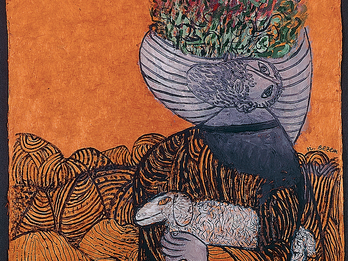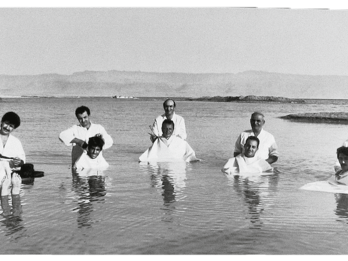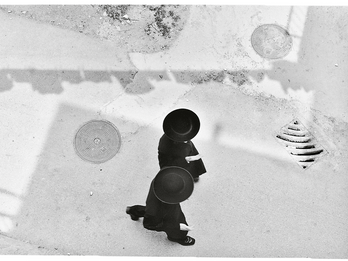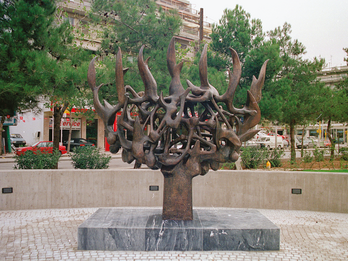Nine Out of Four Hundred (The West and the Rest)
Sensitive Content
In this photograph, which has become an important image to represent Mizraḥi protest in Israel, artist Meir Gal holds the official Jewish history textbook used in Israeli high schools in the 1970s by the only nine pages in it that deal with non-Ashkenazi Jews. In a statement he wrote:
Since the establishment of Israel we have heard mostly from and about its European (Ashkenazi) Jews. Numerous books and articles have depicted the State of Israel as a country which has successfully managed to bring together people of different ethnic origins. Unfortunately, these publications have created a perception that is far from the realities non-Ashkenazi groups have had to endure. Mizrahim (Jews of Asian and African origins, and Arab Jews, commonly referred to as Sephardim) who have written extensively about the discrimination against Mizrahim in Israel and who have documented the history of Mizrahi resistance have been censored and criticized. To this day, Mizrahi activists in Israel are marginalized and often excluded from public positions and funding.
The official textbooks on the history of the Jewish people used in Israeli schools are dedicated almost exclusively to the history of European Jewry. For decades the Ministry of Education systematically deleted the history of Jews who came from the Middle East, Asia, and Africa. These books helped establish a consciousness that the history of the Jewish people took place in Eastern Europe and that Mizrahim have no history worthy of remembering. The origins of this policy date back to the mid 1800s to the Ashkenazi treatment of the Mizrahi diaspora prior to the establishment of the State of Israel. Both Jewish European communities as well as the Jewish Eastern European leadership in Palestine (and later in Israel), categorized non-European Jews as backward and primitive. Cautionary measures in the form of selective immigration policies were enacted in the 1950s in order to reduce the “dangerous Levantine influence” of non-European cultures on the new Israeli entity.
Mizrahim historically suffered no contradiction between being a Jew and an Arab simultaneously. The advent of Zionism and the establishment of the Israeli State drove a wedge between Mizrahim and their origins, and replaced their Jewish - Arab identity with a new Israeli identity based on European ideals as well as hatred of the Arab world. From the moment of their arrival in Israel, Mizrahim were forced to deny their Jewish-Arab identity which they had held for centuries in Arab countries and in Palestine. The inevitable outcome was an irreconcilable Mizrahi denial of its own past which gradually evolved into self-hatred. The severe racial conflict within Israel, its resulting class division as well as its impact on the Israeli-Palestinian conflict, is absent from most discourse on Middle Eastern history and politics.
The book shown in the photograph is the official textbook of the history of the Jewish people in recent generations that was used by high school students (including myself) in the 1970s. The nine pages I’m holding are the only pages in the book that discuss non-European Jewish history. Hence the title: Nine Out of Four Hundred (The West and the Rest). My intention is to put an end to the speculative character of the argument whether or not Mizrahim have been discriminated in Israel. Today the Ministry of Education continues to erase the history of its non-European Jews despite the fact that they comprise more than half of the Israeli population. This is only one example of how the State of Israel continues to minoritize its non-European majority.
Credits
Published in: The Posen Library of Jewish Culture and Civilization, vol. 10.








